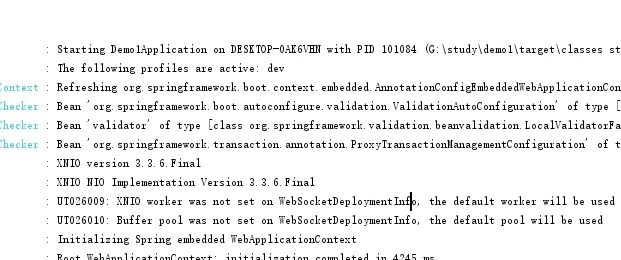这篇文章将为大家详细讲解有关使用spring boot实现profiles动态切换,文章内容质量较高,因此小编分享给大家做个参考,希望大家阅读完这篇文章后对相关知识有一定的了解。
具体做法:
1、首先在pom中添加profiles:
<profiles>
<profile>
<id>dev</id>
<activation>
<activeByDefault>true</activeByDefault>
</activation>
<properties>
<spring.profiles.active>dev</spring.profiles.active>
</properties>
<dependencies>
<dependency>
<groupId>org.springframework.boot</groupId>
<artifactId>spring-boot-devtools</artifactId>
<optional>true</optional>
</dependency>
<dependency>
<groupId>org.springframework.boot</groupId>
<artifactId>spring-boot-starter-undertow</artifactId>
</dependency>
</dependencies>
</profile>
<profile>
<id>prod</id>
<dependencies>
<dependency>
<groupId>org.springframework.boot</groupId>
<artifactId>spring-boot-starter-undertow</artifactId>
</dependency>
</dependencies>
<properties>
<spring.profiles.active>prod</spring.profiles.active>
</properties>
</profile>
</profiles>dev指开发模式,prod指生产模式,如需其他模式,只需要添加profile即可.
2、在pom.xml的build中添加plugin:
<plugin>
<groupId>org.apache.maven.plugins</groupId>
<artifactId>maven-resources-plugin</artifactId>
<version>${maven-resources-plugin.version}</version>
<executions>
<execution>
<id>default-resources</id>
<phase>validate</phase>
<goals>
<goal>copy-resources</goal>
</goals>
<configuration>
<outputDirectory>target/classes</outputDirectory>
<useDefaultDelimiters>false</useDefaultDelimiters>
<delimiters>
<delimiter>#</delimiter>
</delimiters>
<resources>
<resource>
<directory>src/main/resources/</directory>
<filtering>true</filtering>
<includes>
<include>**/*.xml</include>
<include>**/*.yml</include>
</includes>
</resource>
<resource>
<directory>src/main/resources/</directory>
<filtering>false</filtering>
<excludes>
<exclude>**/*.xml</exclude>
<exclude>**/*.yml</exclude>
</excludes>
</resource>
</resources>
</configuration>
</execution>
</executions>
</plugin>该配置用来在打包的时候修改配置文件。
3、编写DefaultProfileUtil工具类来添加默认启动配置文件:
import org.springframework.boot.SpringApplication;
import org.springframework.core.env.Environment;
import java.util.HashMap;
import java.util.Map;
/**
* Utility class to load a Spring profile to be used as default
* when there is no <code>spring.profiles.active</code> set in the environment or as command line argument.
* If the value is not available in <code>application.yml</code> then <code>dev</code> profile will be used as default.
*/
public final class DefaultProfileUtil {
private static final String SPRING_PROFILE_DEFAULT = "spring.profiles.default";
private DefaultProfileUtil(){
}
/**
* Set a default to use when no profile is configured.
*
* @param app the spring application
*/
public static void addDefaultProfile(SpringApplication app) {
Map<String, Object> defProperties = new HashMap<>();
/*
* The default profile to use when no other profiles are defined
* This cannot be set in the <code>application.yml</code> file.
* See https://github.com/spring-projects/spring-boot/issues/1219
*/
defProperties.put(SPRING_PROFILE_DEFAULT, Constants.SPRING_PROFILE_DEVELOPMENT);
app.setDefaultProperties(defProperties);
System.out.println(app);
}
/**
* Get the profiles that are applied else get default profiles.
*/
public static String[] getActiveProfiles(Environment env) {
String[] profiles = env.getActiveProfiles();
if (profiles.length == 0) {
return env.getDefaultProfiles();
}
return profiles;
}
}public class Constants {
public static final String SPRING_PROFILE_DEVELOPMENT = "dev";
public static final String SPRING_PROFILE_PRODUCTION = "prod";
private Constants() {
}
}4、修改application.yml配置文件,添加(采用application.properties文件):
spring:
profiles:
active: #spring.profiles.active#maven的构建的时候会替换#spring.profiles.active#
5、修改项目的启动类:
@SpringBootApplication
public class Demo1Application {
private static final Logger log = LoggerFactory.getLogger(Demo1Application.class);
public static void main(String[] args) {
SpringApplication app = new SpringApplication(Demo1Application.class);
DefaultProfileUtil.addDefaultProfile(app);
Environment env = app.run(args).getEnvironment();
log.info("\n----------------------------------------------------------\n\t" +
"Application '{}' is running! Access URLs:\n\t" +
"Local: \t\thttp://localhost:{}\n\t" +
"----------------------------------------------------------",
env.getProperty("spring.application.name"),
env.getProperty("server.port"));
}
}以上修改完成之后,在启动的时候会显示:The following profiles are active: dev 默认dev模式切换成功。

6、构建项目:
采用mvn clean package -Pprod命令构建,最后的配置文件会被改成:

关于使用spring boot实现profiles动态切换就分享到这里了,希望以上内容可以对大家有一定的帮助,可以学到更多知识。如果觉得文章不错,可以把它分享出去让更多的人看到。
亿速云「云服务器」,即开即用、新一代英特尔至强铂金CPU、三副本存储NVMe SSD云盘,价格低至29元/月。点击查看>>
免责声明:本站发布的内容(图片、视频和文字)以原创、转载和分享为主,文章观点不代表本网站立场,如果涉及侵权请联系站长邮箱:is@yisu.com进行举报,并提供相关证据,一经查实,将立刻删除涉嫌侵权内容。